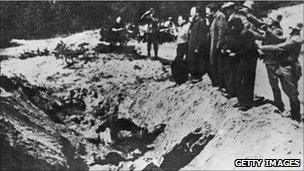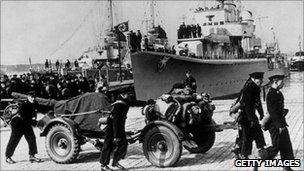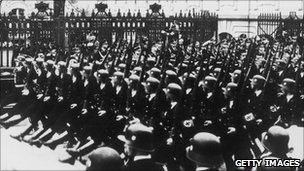'I was forced to watch Nazi killing of Jews aged seven'
- Published

SS soldiers would often shoot their victims at close range - as pictured here at Babi Yar in Ukraine
Aleksandras Iljasevicius was born a Muslim Tatar in Lithuania. At the age of seven, he was made to watch Nazi troops execute his Jewish friends and neighbours.
Almost 70 years on, a retired teacher in the US, he has revisited his childhood memories to mark international Holocaust remembrance day, in an interview with the BBC World Service.
My family had an estate and a mill in the countryside, but because my Dad was in the Lithuanian military we also lived in Kaunas [Lithuania's second city]. In the summer, my sister and I lived with my grandmother in Rumsiskes, a little town.
I was a practising Muslim. But at the playground in Rumsiskes there were Jewish kids, and we became friends and visited each other's homes. We became rather close.
Before the German invasion there was an invasion by Russia. That was very serious for our family, because we were considered to be landowners and enemies of the people.
To survive we immediately signed over our land and property to the Soviet state, and my sister and I went to stay with my grandmother in Rumsiskes.
When the Germans invaded Lithuania, we went to the abandoned local office of the Communist Party and found a list of people to be deported. My sister, grandma and I were three days away from being shipped to Siberia.
When the Germans came, they rounded up the men and took them to the edge of a forest not far from a little brook and had them dig a long trench.
It was a very warm day, I don't know if it was spring or summer.
Charade
The whole town was forced to stand on both sides of the main street. The Jewish families - mums, children and men - were walking by us crying.

The Nazi invaders told Lithuanian Tatars that they would be executed once Germany had won the war
The daughters were carrying little dolls, and the boys were carrying little suitcases.
I asked my grandma why they were crying. She said "Shhh, don't say anything!" Then we all had to walk to the edge of the forest, and we were told to sit there and watch.
The Germans were enjoying themselves, drinking. They were killing five or six people at a time.
There were approximately 40 or 50 Jews in that little community.
There was a lot of crying and wailing. Women would run up to the SS troops and beg them not to kill them immediately.
The Germans would say: "Well, what do you have to give me?" So they gave them gold trinkets or coins and the Germans would send them to the end of the line.
This continued until they had all been killed.
I remember that I was very hot and very upset.
Sense of helplessness
The events of that day resulted in a tremendous build-up of fear and anger inside me.
I never understood until recently - I am now 76 - that the anger probably came from the fact that my grandmother and the other adults could not protect the Jewish population.
And therefore they clearly couldn't protect me or my sister. The sense of helplessness and of being alone when you are seven is truly terrifying.

More than 200,000 Lithuanian Jews were killed in World War II, many of them by SS death squads
Lithuanian Tatars have Mongolian blood. So the Germans declared that we were not pure Aryan and gave us official notice that once they had won the war, they would kill us.
I never talked to my loved ones about my memories. I have been in therapy repeatedly to deal with this, but I never knew the source of my anger - or fear for that matter.
I felt a tremendous amount of identification with the children who were killed. I felt that I too could have been there with my playmates standing at the edge of the grave.
I could not listen to anything about the Holocaust or see war movies. I still begin to cry and I am terrified.
The murders of John F Kennedy and Martin Luther King and now the killings in Arizona have evoked in me the same sense of helplessness, and I cry.
My wife persuaded me to go back to Lithuania in 2004. There is a memorial gravestone where the killings happened.
Of course going there was extremely emotional and very upsetting. But I have been there three times now, and each time it becomes a little more bearable.